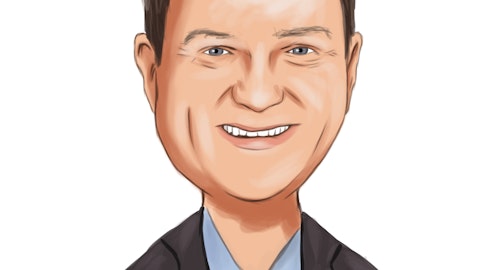Thomas Peterffy: Well, if you believe that they will cut it, good luck to you.
Kyle Voigt: I guess if we do start to see that move, I guess, does that change your viewpoint or is what you said earlier?
Thomas Peterffy: It is a risk we cannot take because if you’re right, we’ll actually make extra money. But if we’re wrong, we can lose a fortune, because as rates go up, we have to raise the rate that we pay to our clients. And I don’t want to be in a situation, we don’t want to be a situation where we are lent up in the long — on the long end and we’re borrowing on the short-term from our customers. So we can get clean that way, and we will not do that.
Kyle Voigt: Understood. And last question for me. It’s just the yield on customer credit balances that you’re paying out the clients came in a bit lower than we expected. Paul, I know you said $20 billion is the fully rate-sensitive cash figure? I just want to confirm that $20 billion figure does that also include balances that are partially rate sensitive within there? I just wanted to confirm that.
Paul Brody: Right. I mean, it includes the equivalent of the fully sensitive balance, right? So we pay a pro rata portion of our full rate on accounts that have between $10,000 and $100,000 in equity. We’ve calculated the equivalent effective principle on which full map the full rate would have been paid, right? So it’s a good number to assume they’re fully sensitive.
Kyle Voigt: Yes. And the interest rate sensitivity that you gave earlier, Paul, I just want to confirm as well, that does not include, I’m assuming, the interest — additional interest that you’d also earn on corporate cash balances. Is that correct?
Paul Brody: No, it does assume that both the customer side and the investment side move together, right? And we have quite a short duration. And so those are fully absorbed run rates, but it wouldn’t take us that long to get there as rates move around given that our duration is short.
Kyle Voigt: Okay, thank you.
Operator: Thank you. Our next question comes from the line of Chris Allen of Citi. Please go ahead, Chris.
Chris Allen: Good evening, guys. I was wondering if maybe you could give some color just in terms of the account growth where there was any strength in any particular customer segments or regions relative to any others this quarter?
Thomas Peterffy: Well, look, our fastest that can’t grow is individuals, followed by traders, followed by hedge funds, followed by I-Brokers and lastly, financial advisers. So that’s the relative rate of growth. And that is for the last 12 months, so I have not broken this out for the last quarter. But — so look, basically, probably the last quarter hedge funds growth is probably €“ yes, that is unusually high. And we don’t do as well with financial advisers as we do with hedge funds. The software development that Milan mentioned having to do with financial advisers is meant to better that growth rate.
Chris Allen: Got it. Any specific regions growing faster than others at the moment?
Thomas Peterffy: Yes, I think it’s to a large extent, this is a word of mouth game, right? And it just so happens that we are doing very well among excellent people and financial advisers are more or they are locked up to the extent that they are associated work Morgan Stanley and UBS, they are locked up there. To the extent they are independent. They are with Schwab and Ameritrade. And so they are not as easily and there are not so many new of them that start, right? So it is a more difficult task to get new financial adviser then it is to their hedge funds.
Chris Allen: Got it. And just is there any way you guys can frame out the Hungary bank license, what that might mean just in terms of the inability to fund margin loans in Europe right now, what the demand would theoretically be, any way to think about that?
Thomas Peterffy: Well, margin accounts, currently, we cannot use customer monies to land out to other customers in the EU, and we have roughly a similar demand in the U.S. we have in the U.S. for that. And so we are currently using our own money. In the future we will be able to use other customers’ money.
Chris Allen: Got it. Thanks a lot guys.
Operator: Our next question comes from the line of Richard Repetto of Piper Sandler. Please go ahead, Richard.





